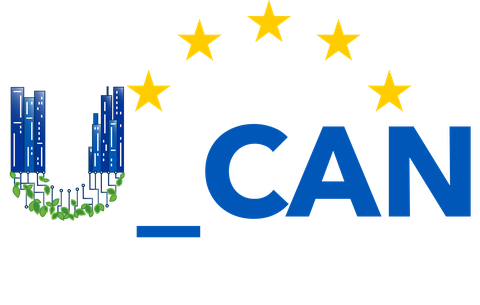May 21, 2024
‘U_CAN’: TU Dresden research project supports Ukraine on the path to climate neutrality
Amidst the challenges posed by conflict and infrastructure devastation, Ukraine seeks support from international allies in many respects. The 'U_CAN: Ukraine towards Carbon Neutrality' project at TU Dresden, funded by the Horizon Europe program, aims to aid the nation in rebuilding while aligning with climate neutrality goals and smart city strategies. Leveraging networks, participation, and knowledge transfer, alongside engagement with eight Ukrainian cities, this initiative embodies a collaborative approach to climate neutrality and sustainable development.
WISSENSARCHITEKTUR - Laboratory of Knowledge Architecture (TU Dresden) has established an impressive network of international cooperation partners for the U_CAN project and raised a total of 5 million euros via the Horizon Europe funding program. U_CAN will officially start with a kick-off meeting on May 23 and May 24 at TU Dresden. The project is scheduled to run until 2028.
The state capital Dresden is an important cooperation partner. It is part of EU mission “100 Climate Neutral and Smart Cities (CNSC) and has already collaborated with TU Dresden on numerous projects. Dresden has a solidarity partnership with the Ukrainian city of Khmelnytskyi, which is participating in the U_CAN project with two of its universities.
Alongside the European Citizen Science Association and the DIN Institute for Standardization from Germany, the U_CAN consortium also has partner institutions, NGOs, and universities from Poland, Slovakia, Denmark, Italy, Greece, Austria and Ukraine. Together, they offer expertise to Ukrainian cities, enabling continued participation in the CNSC mission of the European Green Deal (EGD), which aims for Europe-wide climate neutrality by 2050.
In 2020, Ukraine passed a position paper to the European Commission on Ukraine’s vision of implementing European Green Deal and continues to pursue their goals despite the state of war. Eight Ukrainian cities: Lviv, Kyiv, Zhytomyr, Khmelnytskyi, Invano-Frankivsk, Vinnytsia, Kharkiv and Kherson – have committed to participating in U_CAN and furthering the EGD vision.
The WISSENSARCHITEKTUR research team will facilitate tailored approaches and strategies. In strategy workshops, the scientists and partners identify goals, key sectors, stakeholders whose opinions and knowledge should be included in certain decisions, as well as possible technologies and practices and potential for support. They will organize training and capacity building, e.g. Citizen Science (participatory projects for committed citizens). A publicly accessible project platform will be launched shortly after the project start, to make available the project progress, updates as well as the U_CAN knowledge bank according to principles of open sciences.
The six partner cities are to become ‘model cities’ for the whole of Ukraine, driving progress nationwide. WISSENSARCHITEKTUR's interconnected network facilitates knowledge exchange with civil society and scientific partner institutions. They will share best practices with the CNSC mission cities. Additionally, they will acquire the potential to adapt successful models to other Ukrainian municipalities.
“Our interdisciplinary team at WISSENSARCHITEKTUR is excited to contribute its wealth of experience in innovation management, participation and knowledge transfer to U_CAN,” Prof. Dr Jörg Rainer Noennig, Head of WISSENSARCHITEKTUR says. ‘We share experiences and create new impetus for fundemental research. We will all benefit.’
Swati Kulashri, U_CAN project manager (WISSENSARCHITEKTUR): “In these challenging times, we stand in solidarity with the people of Ukraine. Through collaboration, capacity building and climate-friendly initiatives, we strive to empower the Ukrainian cities to foster resilience and hope for a brighter future.”
Claudia Hawke, European Project Centre: "We have been supporting the researchers at WISSENSARCHITEKTUR for many years in the project management of their EU collaborations and are delighted to be involved in this challenging project once again."
Project partners and more information on the climate goals of the Ukrainian partner cities: https://tud.link/7cesuc
Media Contact:
Markus Jüngling
Communications Manager WISSENSARCHITEKTUR - Laboratory of Knowledge Architecture
About WISSENSARCHITEKTUR - Laboratory of Knowledge Architecture
The WISSENSARCHITEKTUR - Laboratory of Knowledge Architecture is an interdisciplinary think-tank conducting research, design, and consultation at the intersection of design and social sciences. The interdisciplinary research team has over 10 years of experience on participation and cooperation formats in urban development and smart city topics. WISSENSARCHITEKTUR is currently leading the scientific research in the ‘Model Project Smart City Dresden’ (2022-2026) funded by the German government.
About funding program Horizon Europe
Horizon Europe is the EU’s key funding program for research and innovation. It tackles climate change, helps to achieve the UN’s Sustainable Development Goals and boosts the EU’s competitiveness and growth. The program facilitates collaboration and strengthens the impact of research and innovation in developing, supporting and implementing EU policies while tackling global challenges. It supports the creation and better diffusion of excellent knowledge and technologies.


